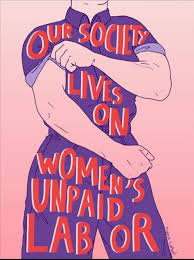Posted by Sam Patrick
on October 29, 2024

For centuries, women have been oppressed in ways that enable men to benefit from societal, legal, and economic structures designed to uphold male dominance. This oppression often goes unnoticed or unacknowledged, but the reality is that men’s success and societal power have historically been built on the backs of women’s unacknowledged and undervalued labour. From laws designed to protect men rather than women, to a justice system that routinely fails female victims, the patterns are undeniable. If the scale of gender-based violence and injustice were fully addressed, the implications would be profound.
The Legacy of Gendered Oppression in Legal Systems
One glaring example of this systemic failure is the UK’s approach to marital rape and domestic abuse. Until as recently as 1991, marital rape was not recognised as a crime in Great Britain, meaning men could legally force themselves on their wives without repercussion. This is not a distant historical fact; it was only in the past few decades that the law acknowledged a woman’s right to bodily autonomy within marriage. The reluctance to criminalise such behaviour speaks volumes about the legal system’s priorities and whom it is truly designed to protect.
Even now, convictions for rape and domestic abuse are alarmingly low. In England and Wales, only about 1% of reported rapes lead to a charge, much less a conviction. Despite an estimated 1.6 million women experiencing domestic abuse annually, perpetrators are often left free to continue their abuse due to low prosecution rates. This failure to protect women sends a message: the suffering and trauma of women are secondary to maintaining a system where men are seldom held accountable.
The Economic Exploitation of Women’s Labour
Women’s unpaid labour has long been a foundation of the global economy. In the UK, women perform, on average, nearly twice as much unpaid domestic labour as men. This work includes child-rearing, household management, and emotional support, often referred to as the "second shift." This burden allows men to focus on career advancement and economic opportunities, frequently at the expense of women’s health, time, and potential career growth.
Women’s lower earnings, a product of systemic wage gaps and glass ceilings, further exacerbate economic dependency. When men thrive in their careers, they often do so because of the silent sacrifices of women who manage the domestic sphere. This economic disparity is not an accident; it is a structural feature of a society that values men’s labour over women’s, using women’s unpaid contributions to bolster men’s success.
A Justice System That Fails Women
One of the starkest examples of systemic oppression is how the legal system routinely fails women. Statistically, violence against women is under-prosecuted and under-sentenced. Studies show that if laws were strictly enforced and all instances of sexual assault, domestic violence, and harassment were prosecuted, over half of the male population would face legal consequences. This staggering statistic underscores the depths of gendered violence embedded within society.
Beyond sexual and domestic violence, the justice system’s treatment of female survivors is profoundly flawed. Victims of assault and abuse are frequently re-traumatised by the judicial process, often being blamed or questioned in ways that discourage reporting. Meanwhile, the lack of adequate sentencing or legal consequences for men involved in these crimes sends a clear message: men’s interests and freedom take precedence over women’s safety and justice.
The Psychological Toll and Societal Consequences
When women are oppressed and their rights overlooked, men benefit from a psychological cushion that protects their egos and preserves a status quo of male superiority. Women are systematically denied opportunities, resources, and basic rights, making them more vulnerable to exploitation and control. This suppression allows some men to feel validated in their dominance and perpetuates a toxic cycle of superiority that relies on keeping women down.
The toll on women’s physical and mental health is substantial. Women experience higher rates of anxiety, depression, and trauma due to these systemic injustices, conditions exacerbated by a society that continually places blame on them while excusing men. Society, as a whole, suffers when half the population is systematically disadvantaged, yet it is the patriarchy that enforces this system to maintain its power and control.
Breaking the Cycle: A Demand for Change
If society were to hold all men accountable for the myriad forms of abuse and exploitation they perpetuate or benefit from, the repercussions would be transformative. By valuing women’s experiences, recognising unpaid labour, and enforcing laws that protect women from violence and abuse, society could move closer to true equality. But as it stands, the current structure is designed to keep women down, masking systemic oppression as normalised gender roles and legal loopholes.
To break this cycle, we must demand justice and accountability. Women deserve not only recognition for their contributions but also full legal, social, and economic equality. Without this, men will continue to benefit from the silent, unpaid, and often invisible work and suffering of women—a reality we must confront to build a fairer society for all.

